|
|
|
Sort Order |
|
|
|
Items / Page
|
|
|
|
|
|
|
| Srl | Item |
| 1 |
ID:
135195
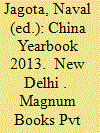

|
|
|
|
|
| Publication |
New Delhi, Magnum Books Pvt Ltd, 2014.
|
| Description |
165p.Pbk
|
| Contents |
In association with Institute for Defence Studies and Analyses
|
| Standard Number |
9789382512240
|
|
|
|
|
|
|
|
|
|
|
|
Copies: C:2/I:0,R:0,Q:0
Circulation
| Accession# | Call# | Current Location | Status | Policy | Location |
| 058023 | 915.1/JAG 058023 | Main | On Shelf | General | |
| 058024 | 915.1/JAG 058024 | Main | On Shelf | General | |
|
|
|
|
| 2 |
ID:
139814


|
|
|
|
|
| Publication |
New Delhi, Magnum Books Pvt Ltd, 2015.
|
| Description |
299p.Pbk
|
| Contents |
In association with Institute for Defence Studies and Analyses
|
| Standard Number |
9789382512264
|
|
|
|
|
|
|
|
|
|
|
|
Copies: C:2/I:0,R:0,Q:0
Circulation
| Accession# | Call# | Current Location | Status | Policy | Location |
| 058255 | 915.1/SIN 058255 | Main | On Shelf | General | |
| 058256 | 915.1/SIN 058256 | Main | On Shelf | General | |
|
|
|
|
| 3 |
ID:
144795
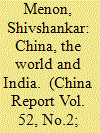

|
|
|
|
|
| Summary/Abstract |
After more than three decades of stupendous growth, China is in the process of making the painful transition to a lower growth path. As it does so, the ruling CPC is increasingly turning to nationalism to provide legitimacy in the eyes of its own people. China now openly seeks to ‘display its prowess’ and ‘assume its responsibilities’ in the world. However, it still lacks the capability to impose a political or security order of its own in its immediate neighbourhood. There is, therefore, likely to be a period of instability in the Asia–Pacific region, and the environment in which India pursues its interests will get more complex. China and India today have a relationship with elements of both cooperation and competition. While both countries have a common interest in improving on the existing security and economic order, they compete in the periphery they share. A danger present in present-day India–China relations comes from the mutual gap between perception and reality. Nevertheless, this article argues that this is a moment of opportunity for India–China relations, and that each country could benefit its core interests by working with the other.
|
|
|
|
|
|
|
|
|
|
|
|
|
|
|
|
| 4 |
ID:
193433
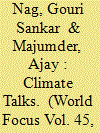

|
|
|
|
|
| Summary/Abstract |
This article is an attempt to reflect on the CoP process of addressing the uphill task of climate change. So far, there have been 28 conferences on climate change under the aegis of the UN. The CoP28 held in Dubai has added new dimensions to the hermeneutics of climate change discourse. The authors have endeavoured to unravel the process of underlying politics of new policy making that is fraught with challenges amidst North South division, rampant geopolitical tensions and capitalism’s entry into the new age of information revolution. In this perspective aspects of Sino-Indian climate diplomacy have been discussed to bring out and understand their convergence and divergence.
|
|
|
|
|
|
|
|
|
|
|
|
|
|
|
|
| 5 |
ID:
179268
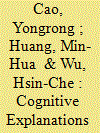

|
|
|
|
|
| Summary/Abstract |
In recent years, the economic development of China and India and their border confrontations have intensified bilateral strategic competition. This study used the State of Democracy in South Asia survey to identify dual mindsets of competition and contingency that drive how Indians perceive China’s influence in Asia. These two mindsets are based on a cognitive schema characterized by a political predisposition against China. However, this negative orientation is moderated as more information is acquired regarding the impact of China on India. The competition mindset does not always manifest itself, and is only cognitively activated when a change is perceived in India’s power status. On the other hand, the contingent principle appears whenever competition seems to have abated, or disadvantage seems unavoidable. The mindsets of competition and contingency are not only relevant to the evolution of Sino–Indian relations, but also explain how Indian policymakers behave and respond in international society.
|
|
|
|
|
|
|
|
|
|
|
|
|
|
|
|
| 6 |
ID:
170990
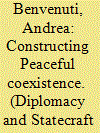

|
|
|
|
|
| Summary/Abstract |
ABSTRACT
In the mid-1950s, Jawaharlal Nehru advanced an alternative approach to regional security, pursuing it enthusiastically. He held that employing diplomacy in accord with the ‘Five Principles’ of peaceful coexistence, regional governments could establish ‘areas of peace’ and achieve ‘collective peace’. China played an essential role in this process, becoming the lynchpin of Nehru’s regional strategy. Although mindful of China’s potentially subversive role in Asia, Nehru downplayed such misgivings, urging Beijing’s commitment to the Principles. By doing so, he endeavoured to ‘create an environment’ where China would find it increasingly difficult ‘to break away from the pledges given’. Furthermore, by supporting China’s participation to the 1955 Bandung Conference, he wished to end Beijing’s isolation and transform India’s giant neighbour into a stabilising regional force. This analysis revisits Nehru’s policy of peaceful coexistence, making a fresh contribution to the study of Cold War India’s external relations. In addition, it explains how such a policy, crucially centred on Sino-Indian rapprochement, took shape and appeared, at least briefly, to make progress and deliver on Nehru’s expectations
|
|
|
|
|
|
|
|
|
|
|
|
|
|
|
|
| 7 |
ID:
158774
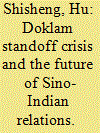

|
|
|
| 8 |
ID:
161248
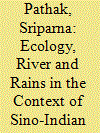

|
|
|
|
|
| Summary/Abstract |
With the world increasingly moving towards a drier, arid and dangerous future, sustainable development of shared resources such as water and natural habitats have become of prime importance. However, these resources do not fall within the geographical or political boundaries of any particular nation state, which makes management completely based on cooperation and diplomacy. India and China both are rapidly developing states and have been playing important roles at the international stage on issues of climate change and sustainable development.
|
|
|
|
|
|
|
|
|
|
|
|
|
|
|
|
| 9 |
ID:
135468
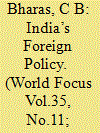

|
|
|
|
|
| Summary/Abstract |
Thus, it is clear that “With the gradual accretion of power by states such as China and India, the world may now be witnessing a major shift in power dynamics.” The Sino-Indian security relations shall have a tremendous impact on future and over all stability of Asia. When the security system of a state shall be at stake, when internal disturbance shall be cause of concern and in an environment of international terrorism, a security-centric national policy will of course, be given priority.
|
|
|
|
|
|
|
|
|
|
|
|
|
|
|
|
| 10 |
ID:
056634
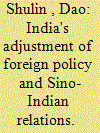

|
|
|
| 11 |
ID:
144010
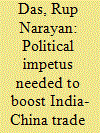

|
|
|
|
|
| Summary/Abstract |
In the narrative of the dynamic and yet complex Sino-Indian relations, bilateral economic relations between the two countries occupy a very critical space. With a combined population of 2.5 billion, China and India are the two most populous countries in the world constituting about 38% of world population. Together they account for one- tenth of gross domestic product of the world.
|
|
|
|
|
|
|
|
|
|
|
|
|
|
|
|
| 12 |
ID:
141911


|
|
|
|
|
| Summary/Abstract |
Sino-Indian relations were governed by concerns about an unsound bilateral bonhomie, internal as well as external strategic and political considerations, and in addition, national interests and priorities not necessarily oriented towards pacifying the bilateral relations. The change in leadership presented a golden opportunity for refiguring the India–China relationship in terms of mutual economic gains, crafting a durable framework to deal with their border dispute, marking the culmination of a great deal of proactive diplomacy and planning by both governments in a short period of time and thereby giving a new dynamism to the bilateral relationship. The sustained progress in the multifarious strategic issues such as trade deficit, border disputes and investment has eventually built trust between the two nations. This article explores how both nations have continued their efforts with a series of important cooperation initiatives in the areas of economy, culture, trade and borders to achieve peaceful cooperation and inclusive development for the benefit of two peoples in particular and in the interest of peace and stability in the world in general.
|
|
|
|
|
|
|
|
|
|
|
|
|
|
|
|
| 13 |
ID:
148585
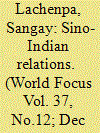

|
|
|
|
|
| Summary/Abstract |
The Sino-Indian Relations has come a long way from friendship to confrontation to detente to normalisation. Historically, both the nations have paid the price for its past errors. Today, as the rise of China and India is a major phenomenon for global politics. It has the potential of changing the present global system and international discourse. Keeping this in the background, despite presence of deep rooted difficulties and mutual suspicion, both India and China have embarked upon a course of dialogue and cooperation while keeping the border issues and differences aside.
|
|
|
|
|
|
|
|
|
|
|
|
|
|
|
|
| 14 |
ID:
024009
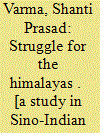

|
|
|
|
|
| Edition |
2nd rev.ed.
|
| Publication |
New Delhi, Sterling Publishers P. Ltd., 1971.
|
| Description |
xii, 316p.Hbk
|
|
|
|
|
|
|
|
|
|
|
|
Copies: C:1/I:0,R:0,Q:0
Circulation
| Accession# | Call# | Current Location | Status | Policy | Location |
| 005715 | 954.042/VAR 005715 | Main | On Shelf | General | |
|
|
|
|
|
|
|
|
|